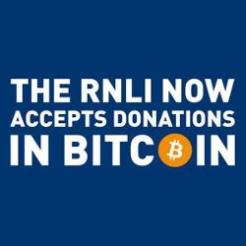RNLI has become the first major UK charity to accept donations in the digital currency, Bitcoin, in a bid to attract new supporters.
Bitcoins do not physicallly exist and are not controlled by a bank or government. They are a part of a growing category of money known as ‘cryptocurrency’, which are created and held electronically and allow users to make transactions over the internet.
Initially RNLI is accepting donations through a dedicated page and will consider integrating it to its standard donation pages if the pilot proves successful.
Leesa Harwood, deputy director of fundraising, said: “Bitcoin is an innovative new kind of currency and we believe that accepting Bitcoin will result in donations we may not otherwise receive, as well as connecting us with new types of supporters.”
RNLI’s decision to enter the virtual currency market was prompted by research into future trends, which Harwood said revealed that “it looked likely that we would receive digital currency as a donation or as part of a legacy at some point and we wanted to be prepared for that eventuality”.
Bitcoin launched in 2009 as an online peer-to-peer payment system with all transactions recorded on a public ledger. The number of businesses accepting Bitcoin as payment is growing and includes the travel company Expedia and Dell the computer retailer.
A number of charities outside of the UK already receive donations through cryptocurrencies, including, the Wikimedia Foundation in the US and Pathways to Education in Canada.
Last year the BitGive Foundation launched in the US to raise money for charities from the Bitcoin community. It recently raised $4,850 for Save the Children US’s Philippines Typhoon Haiyan Children’s Relief Fund.
Earlier this year another crypotcurrency, Dogecoin, raised $30,000 through its foundation for its Doge4Kids programme sending service dogs to families and children in need.









